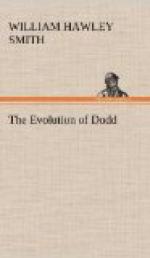CHAPTER III.
It was fully fifteen minutes before Esther and “Dodd” returned to the schoolroom. It takes a large reserve force of both patience and scraping to make presentable such a specimen as “Dodd” was on this memorable morning. But when the two appeared again, the boy’s boots were clean, and his hair was smoothed down, while the book cover showed only a wet spot, of deeper tint than the rest of the book, in place of the black blot that had been so prominent a few minutes before. The girl led the boy to a seat not far from hers and then returned to her own little desk.
While the children were out Miss Stone had time to collect her thoughts, and she began at once to consider what she should do to amuse the child. It had been a primary principle with those who constructed this female educator, that the chief end of a primary teacher was to amuse the children placed under her charge.
This precept had been drilled into Miss Stone, and nothing less than a charge of dynamite could have dislodged it.
She was taught that it was little less than wicked to impose tasks upon young shoulders; that the “pretty little birdies” (this always said with a smile) “enjoyed themselves, hopping about in God’s blessed sunlight, and that it was Nature’s way to have her children happy.”
“Happiness,” in this case, seemed to mean doing nothing, but simply being amused—a definition that finds general recognition among many, there being those who dream of heaven as a place where they can be as everlastingly lazy as they choose, through all eternity, with the celestial choirs forever tooting soft music in the distance, and streams of milk and honey flowing perpetually to their lips, all for their amusement and delectation. Perhaps this last is the correct idea. It might as well be confessed that on this point we are not well posted in this world, though many profess to be. The Father will show us this some day, as he will all else, but till then we can wait.
But, be the employment or enjoyment of heaven what it may, it is evident that in this world a man or a child has something to do besides being amused. We are all born destined for work, rich and poor alike. It is our reasonable service, and the best thing we can do is to fit ourselves for the task, from the very first. Not that our work shall be mere drudgery, though it may be that and nothing more, and, even so, be better than idleness or being amused; but it is the fate of every soul born on earth to be called upon constantly to do things which it had rather not do, just then, anyhow, and whenever such a condition exists, work is the word that describes what has to be done. It is the business of life to work. The Book has it that, “The Father worketh hitherto.” Even the new version has failed to reveal the phrase, “The Father is amused,” and the Master, when a boy, declared that he must attend to the “business” that lay waiting for him.




